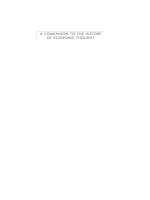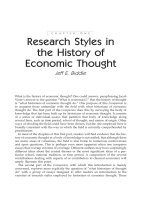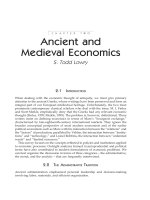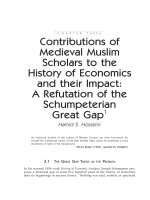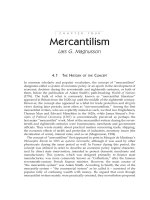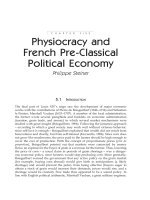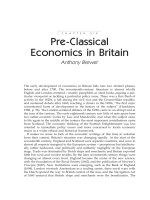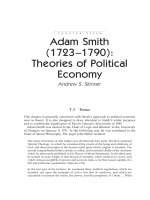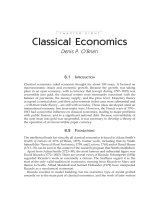The knowledge we have lost in information the history of information in modern economics
Bạn đang xem bản rút gọn của tài liệu. Xem và tải ngay bản đầy đủ của tài liệu tại đây (2.08 MB, 313 trang )
THE KNOWLEDGE WE HAVE LOST IN INFORMATION
THE KNOWLEDGE
WE HAVE LOST
IN INFORMATION
The History of Information in
Modern Economics
Philip Mirowski
and
Edward Nik-K hah
1
1
Oxford University Press is a department of the University of Oxford. It furthers
the University’s objective of excellence in research, scholarship, and education
by publishing worldwide. Oxford is a registered trade mark of Oxford University
Press in the UK and certain other countries.
Published in the United States of America by Oxford University Press
198 Madison Avenue, New York, NY 10016, United States of America.
© Philip Mirowski and Edward Nik-K hah 2017
All rights reserved. No part of this publication may be reproduced, stored in
a retrieval system, or transmitted, in any form or by any means, without the
prior permission in writing of Oxford University Press, or as expressly permitted
by law, by license, or under terms agreed with the appropriate reproduction
rights organization. Inquiries concerning reproduction outside the scope of the
above should be sent to the Rights Department, Oxford University Press, at the
address above.
You must not circulate this work in any other form
and you must impose this same condition on any acquirer.
Library of Congress Cataloging-i n-P ublication Data
Names: Mirowski, Philip, 1951- author. | Nik-Khah, Edward M., author.
Title: The knowledge we have lost in information: the history of information
in modern economics / Philip Mirowski & Edward Nik-Khah.
Description: New York City: Oxford University Press, 2017. | Includes index.
Identifiers: LCCN 2016036012 | ISBN 9780190270056 (hardcover)
Subjects: LCSH: Neoliberalism. | Neoclassical school of economics. |
Practical reason. | Economics.
Classification: LCC JC574.M567 2017 | DDC 338.501—dc23 LC record
available at />1 3 5 7 9 8 6 4 2
Printed by Sheridan Books, Inc., United States of America
CONTENTS
List of Figures and Tables
Acknowledgments
1.It’s Not Rational
vii
ix
1
2.The Standard Narrative and the Bigger Picture
31
3.Natural Science Inspirations
45
4.The Nobels and the Neoliberals
51
5.The Socialist Calculation Controversy as the Starting
Point of the Economics of Information
60
6.Hayek Changes His Mind
66
7. The Neoclassical Economics of Information Was
Incubated at Cowles
73
8.Three Different Modalities of Information in
Neoclassical Theory
101
C ontents
9. Going the Market One Better
124
10. The History of Markets and the Theory of
Market Design
144
11. The Walrasian School of Design
161
12. The Bayes-Nash School of Design
170
13. The Experimentalist School of Design
183
14. Hayek and the Schools of Design
193
15. Designs on the Market: The FCC Spectrum
Auctions
207
16. Private Intellectuals and Public Perplexity:
The TARP
221
17. Artificial Ignorance
233
Notes
Bibliography
Index
243
271
293
VI
LIST OF FIGURES AND TABLES
FIGURES
3.1
8.1
8.2
10.1
Shannon Information Theory
46
The Block Universe of Relativistic Physics
110
The Harsanyi Setup
114
Orthodox Trajectory Through Information
Space, I 153
10.2 Orthodox Trajectory Through Information
Space, II 159
11.1 Reiter’s Schematic
165
12.1 An Equilibrium Bidding Strategy, According to
the Bayes-Nash Approach
177
14.1 Orthodox Trajectory Through Information
Space, III
204
L ist of F igures and Tables
TABLES
4.1
Economics of Information/K nowledge Nobel List,
1969–1994
52
7.1 Cowles Commission Members and their Information
Enthusiasms 80
8.1 Three Formal Approaches to Information
102
15.1 Auctionomics’ Product Comparisons
220
viii
ACKNOWLEDGMENTS
We were inspired to write this book after accepting an invitation
extended by the Institute for New Economic Thinking to present a short course on the history of twentieth-century economics.
Both of us, jointly and separately, had written on themes relevant
to this topic: the confusion evident in the sundry treatments of
information by economists, the neoliberalization of the economics profession, the constructivist turn in economics, and the largely
misunderstood legacy of experimental economics, among others.
Our intention was to summarize this previous work and draw from
it lessons relevant to our post-crisis world: without understanding where orthodox economics is headed, how can the student get
excited about the “new”?
Thus, we set out to explain how the economics profession ended
up in its current state, seen from a doctrinal perspective. We already
had bits and pieces of the story in hand, but setting out to weave
them into a coherent and (we hope) compelling narrative required
that we push far beyond anything we had previously written. What
you hold in your hands is the result.
A cknowledgments
We presented an early draft of this book at the Hong Kong
meetings of the Institute for New Economic Thinking (INET) and
a revised version at INET’s New York studios. We thank INET
for supporting those lectures: this book benefited from the highly
engaged audiences at these two events. Edward Nik-K hah is grateful to the Roanoke College Faculty Research Year program for support to complete this manuscript. Also, we thank Kyu Sang Lee for
providing helpful suggestions at a critical juncture. Both of us wish
to thank the Duke Center for the History of Political Economy for
a resident scholar fellowship, which permitted us to work through
some of these arguments at length in person.
We also want to acknowledge the encouragement of Scott Parris,
now retired, one of the most important academic editors of the history of economics during his tenure at Cambridge University Press
and then Oxford University Press. We will miss you, Scott.
This book makes use of passages from a handful of previously
published articles. Chapter 15 draws from “A Tale of Two Auctions,”
Journal of Institutional Economics 4(1): 73–97. Chapter 16 includes
excerpts from “Private Intellectuals and Public Perplexity: The
Economics Profession and the Economic Crisis,” which appeared
in History of Political Economy, Vol. 45 (suppl 1): 279–311.
X
[1]
IT’S NOT RATIONAL
The most merciful thing in the world, I think, is the inability of the
human mind to correlate all its contents. We live on a placid island
of ignorance in the midst of black seas of infinity, and it was not
meant that we should voyage far. The sciences, each straining in
its own direction, have hitherto harmed us little; but some day the
piecing together of dissociated knowledge will open up such terrifying vistas of reality, and of our frightful position therein, that
we shall either go mad from the revelation or flee from the deadly
light into the peace and safety of a new dark age.
H. P. Lovecraft, “The Call of Cthulhu,” 1928
This book is mostly concerned with the history of economics;
but we would like to suggest at the outset that it also describes
a cultural rupture of far larger import. To a first approximation,
it explores how economists changed what it meant within their
discipline to claim to “know something,” and consequently to lay
claim to a special kind of expertise at the dawn of the twenty-fi rst
century. But this did not happen in a vacuum. Not to sugar-coat
what might be a somewhat unpalatable assertion, what it meant
to “know the truth” changed dramatically and irreversibly after
World War II. In saying this, we are not engaging in the usual
hand-w ringing concerning postmodernism and cultural relativism that pundits have bewailed from the 1990s onwards. After all,
1
T he K nowledge W e H ave L ost in I nformation
distancing oneself from the truth claims made by historical protagonists is just something all good historians do; there is nothing that especially is distinctive or scandalous about agnosticism
in the modern era. Rather, our concern in this book is with the
postwar changes in the perceived validation of the truth mediated
by the rise of “information” in the social sciences, and especially
in economics. The truth, as conceived by modern economists,
has not set anyone free. Instead, it brought about the death of
the Kantian subject, and a subsequent lifeworld hollowed out the
humanist concerns that many people mistakenly think are the
heart and soul of a science of economics.
WHAT IS TRUTH IN ECONOMICS?
Loose talk about “truth” is bound to make most people, and many
economists, skittish in the extreme. Talk about “information,” by
contrast, would seem far less threatening; and rest assured, most
of this book will be couched in the more soothing idiom of “information” because that is how our protagonists preferred it. But we
would be shirking our duty to the reader if we did not admit that
just beneath the surface of our narrative lurks the suspicion that
the surfeit of talk about information serves to obscure something
more essential, which for purposes of this introduction we will
intermittently call “knowledge,” or more brutally, Truth. Given that
the history which follows will present us with the most variegated
conceptions of what it means to “know” something in economics, a
few preliminary observations about our own philosophical position
might be in order.
The postwar worry about truth in economics kicks off with a
relatively famous 1940 article by Chicago economist Frank Knight
2
I t ’ s N ot R ational
entitled, appropriately, “What Is Truth in Economics?” Knight
wanted to get his peers to think a bit harder about what they rather
cavalierly would endorse as Truth.1 One major concern for Knight
was the suspicion that “liberalism” might suffer from debilitating
internal contradictions, such as the incompatibility of the search for
Truth and commitment to a freedom for anyone to think what he or
she likes. Back then, Knight was fighting a losing rear-g uard battle
against the rising tide of logical positivists of the era; he feared a
situation where “truth is merely a game in which the players are free
to make any rules they please.”2 Reading his paper now, it beggars
the imagination that anything nearly so philosophically self-critical
could ever be published in the Journal of Political Economy these
days. One reason for this reversal is that modern economists appear
no longer capable of hard thinking about the nature of Truth; the
best they can manage at Chicago, it seems, is to argue that “good
economists” enjoy a high degree of consensus about economic matters when responding to questionnaires, so not to worry.
To illustrate this, we seek to briefly contrast the bygone Chicago
of Frank Knight with the contemporary Chicago of Luigi Zingales
and collaborators, who in 2013 published an article comparing the responses of forty-one faculty at a very few high-ranked
U.S. research universities, with a sample of U.S. households conducted by the Chicago Booth Financial Trust Index project. Their
headline was that there subsisted remarkable consensus among
their sample of economists, but not with their sample of the lay
public. Zingales and co-author Paola Sapienza reported a striking
thirty-five percentage point gap, on average, between the economists’ beliefs and the public. For example, about three out of four of
the general public respondents said that a “Buy American” policy is
good for manufacturing employment, while only 11 percent of economic experts agree. Nearly all the economists queried avowed that
3
T he K nowledge W e H ave L ost in I nformation
the North American Free Trade Agreement (NAFTA) has helped
Americans prosper, but only half of respondents to the Booth survey thought so. Zingales seemed loathe to admit that the credibility
of the economics profession may have suffered somewhat following
the global economic crisis, still fresh in the minds of his interlocutors, and this might account for the gap.
This paper in a modern idiom is wildly popular in the economics
literature these days, because it reinforces the orthodox self-image of
the economist. First off, there is the extraordinary conviction that all
“real economists of sound instincts” essentially agree on everything,
when in fact what actually happens is that boundaries of orthodoxy
are continuously being policed by a few economists located at a few
top-ranked departments; it follows that their hand-picked peers are
effectively self-selected for consilience; and thus appeals to consensus turn out to be effectively tautologies. Even Frank Knight knew
that reliance on consensus was the lazy man’s definition of Truth.
But second, there lurks a barely repressed contempt for the beliefs
and opinions of the general public. Once upon a time, it was permissible to presume economic agents were pretty smart, and therefore
of sound mind; but no longer. This curious about-face within the
modern economics profession is one of the major themes of the
present volume. The mid-century Walrasian orthodoxy came clad
with all sorts of “welfare theorems” that insisted markets always and
everywhere gave the people what they wanted; but as the “information” revolution began to suggest that market participants didn’t
really know very well what they wanted, then for the first time in history, economists began to assert their competence to “design” markets, with the objective of giving people what economists believed
they should want.
This turns out to be something of far greater import than some
passing dalliance with mere abstract epistemology: as it happened,
4
I t ’ s N ot R ational
it underpins the very politics of the modern profession. One explanation for economists’ recurrent tendency not to trust democracy,
for instance, is that they suspect the man in the street is an epistemic
shambles; in their estimation, economists therefore deserve to be
respected as experts in knowledge, because their training encourages them to approach the reasoning of the layperson with a cold
jaundiced eye. By contrast with economists’ perception of their own
situation of purported unanimity, any consensus they happen to find
among the unwashed is no index of anything whatsoever.
Modern economists love this self-portrayal of their blessed status of epistemic expertise, but it is false in every respect. All you
have to do is read the newspapers to realize individual economists
have been persistently at each other’s throats; the recent crisis
merely brought this situation closer to consciousness for the public. 3 If there is widespread adherence to some doctrines among
economists, that fealty tends to be more in the nature of ceremonial
obeisance than carefully considered conviction.
Let us point to just one example, to prepare the ground for our
history. All economists believe in the “laws of supply and demand,”
right? Every parrot and TV reporter blandly repeats it as gospel
truth. But those who have some appreciation for the history of economic theory, and especially regarding the Sonnenschein/Mantel/
Debreu theorems, which you can find in many graduate microeconomic textbooks, are also aware that those theorems essentially
obviate the existence of any single valued smooth demand curve.
We do not aim to provide a history of the SMD theorems in this
book, because it wanders a bit far from our mandate.4 All we want
to suggest here is that neoclassical economists have been known to
subscribe to contradictory propositions that demand curves both
do and do not exist, simultaneously. Epistemic flexibility goes with
the territory.
5
T he K nowledge W e H ave L ost in I nformation
There is a hermeneutic attitude that will prove conducive to
apprehension of our history: the precept we are suggesting is that
economists nowadays possess a rather louche attitude toward
truth. We do not approach this current history as an occasion for
rabid “gotcha” exercises against the veridically challenged; rather,
we want to ask: What sort of profession treats payments on the side
and conflicts of interest as essentially harmless, as Gerry Epstein
and George DeMartino have documented, and considers a code
of ethics as something only other lesser mortals may need? What
sort of person denies economics is an agonistic field? What kind
of orthodoxy seems comfortable with characterizing the human
subjects of their prognostications as “mindless”?5 What can it
imply when a recent winner of the prestigious John Bates Clark
Medal writes, “in the context of a persuasion game, so long as there
is one provider of information in every state of nature that would
prefer for consumers to have accurate beliefs, the truth will always
be revealed to a consumer to access with reports from all providers”?6 What sort of intellectual revels in the notion that he will
never suffer anything more than fleeting transient embarrassment
(because the public has a notoriously short memory) for statements of dubious veracity, confident no one will ever fire him for
incompetence from a central bank, nor shut down his university
economics department as a cost-saving measure, nor force him to
run the gauntlet of a public shaming exercise? Or, with more direct
reference to the topic at hand in this volume, what can it mean
for some economist comfortably ensconced at the Institute for
Advanced Study in Princeton to write, “Ideas are strangely absent
from modern models of political economy.” 7 In other words, we
aim to echo Frank Knight’s original query: What is truth in modern economics?
The answer deserves something approaching the measured
philosophical and self-critical consideration of a Knight, something
6
I t ’ s N ot R ational
which does not sit well in contemporary discussions of economics.
While we shall not engage in much in the way of explicit philosophizing in this volume, we shall describe in subsequent chapters
how cultural trends and scientific developments helped usher the
economics profession from a period right after World War II—
when there was great uncertainty about what, if anything, they
were capable of saying with confidence about information, knowledge, and truth—into the modern situation, which has converged
on a very peculiar set of epistemic doctrines. The main task of this
volume is to explain how we got from there to here.
Let us oversimplify, in the interests of inviting the reader to
sample our subsequent chapters. For orthodox economists today,
truth is not a matter of morality, nor of individual standards of
veracity, nor even coherence with some simplistic notion of the
scientific method. For the orthodox economist, core doctrine dictates that truth is the output of the greatest information processor
known to humankind—namely, The Market. From the efficient
markets hypothesis to Nash equilibrium in game theory, to rational expectations macroeconomics to the multiple schools of market design, the twenty-fi rst-century economist testifies over and
over again that it is The Market alone that effectively winnows and
validates the truth from a glut of information. The hapless agent
may or may not have ambitious epistemic pretensions; so-called
behavioral economics preaches that the agent is beset with biases
and lapses of attention; but the wise market participant always
defers to the pronouncements of the market. Paraphrasing economist and Mont Pèlerin Society 8 member Robert Barro, as long
as they keep paying us, we must be right.9 Pelf makes right, not
might.
Yet it is the next step in the syllogism that has turned out to be
truly novel. If markets indeed validate truth, then the cadre that
gets to construct the markets gets the final say on the nature of
7
T he K nowledge W e H ave L ost in I nformation
truth. The visible hand that fashions the auction believes it can govern the world.
TALES OF RATIOCINATION
It will probably come as no surprise that we personally do not
accept the economist’s imprimatur of The Market as the final solution to the age-old problem of “What is Truth?” Thus do we owe
the reader some brief cursory indications of the alternative stance
toward truth that governs our principles of selection in this history.
Contrary to academic expectations, it may be helpful to note we do
not fall back on the Philosophy 101 version of “justified true belief ”
as the bedrock for our various narrative choices in this history of
“information.”10 It strikes us that the pertinent organizing principles are not timeless monolithic criteria such as those often championed in Philosophy 101 but, rather, they involve acknowledgment
that epistemology has meant different things to different groups in
intellectual history.
Perhaps the type of philosophical rupture we have in mind
bears a family resemblance to the notion of parrhēsia, the topic of
Michel Foucault’s last lectures.11 He defined the term as the analysis of practices of telling the truth about oneself; what makes that
intersect with our current concerns is that he also proposes that the
notion of parrhēsia was “originally rooted in political practice and
the problematization of democracy, then later diverging towards
the sphere of personal ethics and the formation of the moral subject” (2011, p. 8). While Foucault certainly did not entertain any
parallel equivalent modern rupture back in 1984—there is only
so much prescience one can attribute to Foucault, even given his
well-
k nown foresight concerning neoliberalism—
here we are
intent upon stressing the inescapable connection of politics and
8
I t ’ s N ot R ational
skepticism about democracy in which the modern transformation
of truth is deeply rooted. In short, whereas Foucault was mostly
intent upon comparing Greek thought to the later Christian and
Cynical developments concerning care of the self, we are instead
fascinated with the ways a seemingly technical neutral notion like
“information” has been slowly changing what it means to “know
something” and by the twenty-fi rst century has undermined liberal
secular notions of democracy and Kantian notions of the ethical
self. Hence, we are open to the possibility the history we proffer
here shares certain Foucauvian ambitions with regard to “genealogies”: to clarify how that might work, let us dally briefly with the
genre of detective stories.
The metamorphosis of the detective/spy in modern literature is not often something the average economist takes time out
to contemplate. 12 A little reflection would nevertheless reveal
that the “classical” detective tended to be portrayed as a super-
intelligent (if a bit quirky) soul who would pick up on the little
clues everyone else—a nd especially the plodding copper—would
overlook. From Conan Doyle’s Sherlock Holmes to John Buchan’s
Richard Hannay in the twentieth century, it was the burden of
the superior individual to piece together the shards of history so
as to arrive at the truth concerning guilt or innocence. The same
went for spies, from Dashiell Hammett’s Continental Op to Ian
Fleming’s James Bond. The reader went along for the ride, with
the game being to see if you could outguess the gumshoe or spook
as to whodunit before the story came to its conclusion. But the
superhuman feats of ratiocination began to lose their luster by the
middle of the twentieth century, to be replaced by a different sort
of spy narrative.
As Rob Horning (2012) reminds us, a curiously different sort
of spy popped up in literature around that time. He cites the work
of Eric Ambler—Epitaph for a Spy (1938), Cause for Alarm (1938),
9
T he K nowledge W e H ave L ost in I nformation
Journey into Fear (1940)—as a harbinger of this trend. To quote
Horning:
All of them feature ordinary, slightly disreputable men who
more or less inadvertently end up in the middle of international security conspiracies, accused of crimes they hadn’t
known they committed, fleeing corrupt and/or incompetent
police, or working in coordination with other foreign agents
whose trustworthiness remains undecidable… . The 1930s
brought the kind of war in which every member of society was
indiscriminately targeted for death from above. This would
provoke a climate of militant prudence and ambient mistrust
in which, say, British citizens were expected to destroy any
household maps and falsify local signage to confuse expected
invaders.
Ambler’s novels reflect this growing anxiety over protecting information, brought on both by technological developments that made it easier to disseminate information and by
the entangled complexity that dispersed relevant data across
a broader populace. In Epitaph for a Spy, the protagonist’s
mere possession of a camera embroils him in an intelligence
investigation and he is forced to scheme how to out a foreign agent. Cause for Alarm centers on a machine-company
sales rep who finds himself with access to sensitive armament data. Graham, the hero of Journey into Fear, is targeted
for assassination because his engineering work makes him
know too much when war breaks out. Ambler’s protagonists
rarely know that they know something important; the news
is generally broken to them through a violent attack or an
arrest. They then learn they have become intelligence agents
against their will—t hey have become the unwitting conduit
10
I t ’ s N ot R ational
of vital knowledge that can be transmitted through them
without their being capable of understanding its broader
importance.13
“Intelligence agents against their will”—what an apt turn
of phrase! Instead of possessing some special transcendental
capacity to discern the truth which renders them an ideal spy,
the new model protagonist is a schlub who comes equipped with
little more than mediocre intelligence, but is nonetheless thrust
into a whirlwind of deception and secrets. The basic plot point
is intended to induce vertigo: you, the protagonist, have no idea
what you are doing, but no one but you are able to do this. The
leading man’s meager moiety of information seems insignificant,
but opens a crack to view an unseen world, such that he is caught
up in forces beyond his ken which render that information (and
therefore his life) so critical that the protagonist must risk everything. The meaning and significance of his appointed task may
not always become fully apparent to the bumbling protagonist,
but shadowy players and obscure forces recruit them as unwitting
conduits for history.
Michael Chabon nicely summarizes the standard plot skeleton:
At first the problem sounds manageable. The sleuth agrees to
look into it, make a call, drop in on someone. In the end, after
many neighborhoods and social strata (always coextensive in
a private-eye novel) have been traversed and visited, and after
a vivid array of toughs, losers, and the occasional innocent has
been plotted along intersecting axes of power, money, and lust,
the original problem turns out to go much deeper, and much
higher, than the sleuth or the reader reckoned. That original
problem was only a loose thread, it turns out, and when the
sleuth tugs on it the world unravels.14
11
T he K nowledge W e H ave L ost in I nformation
The place and perspective of the reader are clearly different with the
onset of this new genre. In most cases, the question of whodunit is
not really all that important; indeed, that might be revealed at any
juncture in the narrative. Anyway, there is no great thrill in outguessing a stumblebum. Some key facts might come to light in the course
of events; but equally, cabals and connivance are rarely wrapped up
in a tidy package at the end. The thrill for the reader seems to come
in imagining being caught up in something of world-h istorical significance that he or she had previously never suspected: you, too,
could become a “secret agent” by being in the wrong place at the
right time. Suddenly, any nondescript bush-leaguer can make a difference. The mediocre cog is elevated by Providence, or maybe just
the hand of history. We all avowedly profess to believe in the agency
of the individual, which would imply that we judge personal choices
with respect to outcomes; but the truth of the late modern detective
novel is that stark and simple causal chains are denied to most of us.
Insights of lasting consequence come out of left field, unheralded
and unbidden.15
What makes Horning’s thesis so striking is that he notices two
things about the rupture in spy novels that turn out to be absolutely
central to the history of economics we recount herein: one has to do
with the technical aspects of information, and the other with politics. We quote Horning on the first point:
The spylike pursuit of information rather than knowledge
makes us function less as thinkers than processors, personal
computers—a nd inefficient, low-powered ones at that. We are
not the subjects who know things or intentionally produce
knowledge; we are instead means of circulation—
objects
through which information passes with more or less noise in
the signal. We become not only part of a network but part of
a circuit. We are pawns in a larger game, “a fly caught in the
12
I t ’ s N ot R ational
cog-wheels” as Vandassy, the narrator of Epitaph for a Spy,
puts it.16
This information, this elusive something which we somehow
possess while not quite understanding it, has indeed become a
hallmark of the modern predicament. Rather than believing that
the “truth shall set us free,” we now suspect rather that the truth,
if it be such, keeps us in our place. Since we agents are no longer
expected to be able to comprehensively validate information, or
recognize its worth, it takes on an aura of existence independent of
what we think about it. With some nudging from the computer, this
has been made manifest in the contemporary phenomenon of an
alienated information—something that takes on a life of its own,
a hypostasized entity that has its own dimensions and metrics. The
best we can hope for is to sneak up on it, like a spy, and catch it in
flagrante delicto.
And then there is the political point. Horning makes the astute
observation that this inversion of the spy story did not come out of
the clear blue, but tracked an important change in political theory.
He perceptively cites the work of Friedrich Hayek, who at the very
same time was describing an economic protagonist who only possessed partial and incomplete knowledge of the economy but was
co-opted into the larger conspiracy of The Market to pursue ends
about which he was only vaguely aware. People were not blazingly
rational, said Hayek, but they possessed limited cognitive abilities.
Information was being shuttled hither and yon behind the backs of
traders; they only glimpsed the flash and gleam out of the corners
of their eyes. Government was just another of the shadowy forces
pushing the dim individual from pillar to post; the argument against
the cold war enemy was that he would not acquiesce to the ineffable
wisdom of The Market; and infected with hubris, he could never
know that he was badly mistaken. Big organizations everywhere
13
T he K nowledge W e H ave L ost in I nformation
were lurching around in the dark; people risked becoming cogs in
an inhuman machine. “Agents” in orthodox models of economics
were thus being repurposed as spies in the House of Gov; someday
a real revolution would eject all those misguided souls from government who believed they could control the tides of history, or so
said Hayek.
Once we observe how human agency became diminished in
the modern spy novel, as information becomes reified and hypostasized, it comes as a shock to realize the same thing has happened
in neoliberal political theory, and then, with a lag, also in economics.17 Economic agents were getting lost in the Big Forces that
swirled all about them. Democracy was no longer considered the
bulwark of progress in both instances, because the little guy might
not be depended upon to do the right thing in dire circumstances.
Governments were portrayed as risible attempts to control the
ever-ramifying conspiracies of citizens; faceless bureaucrats never
were capable of understanding the real meaning of events until it
was too late. Only The Market knew for sure. And what it knew
was “information.”
TINKER, TAILOR, SOLDIER, ECONOMIST
The history of economic thought often finds itself nostalgic for
the older spy genres, as though the culture had never moved on.
If the economic agent might seem to have become a little addled,
in the orthodox frame-tale the neoclassical economist never succumbs to similar disorientation. An older, and still very popular,
mode of recounting the saga of economics is constructed around
hagiographic tributes to inscrutable geniuses, who see their way to
truths denied to others, largely by dint of their own exquisite perception and superior intelligence. They are the Sherlock Holmeses
14

